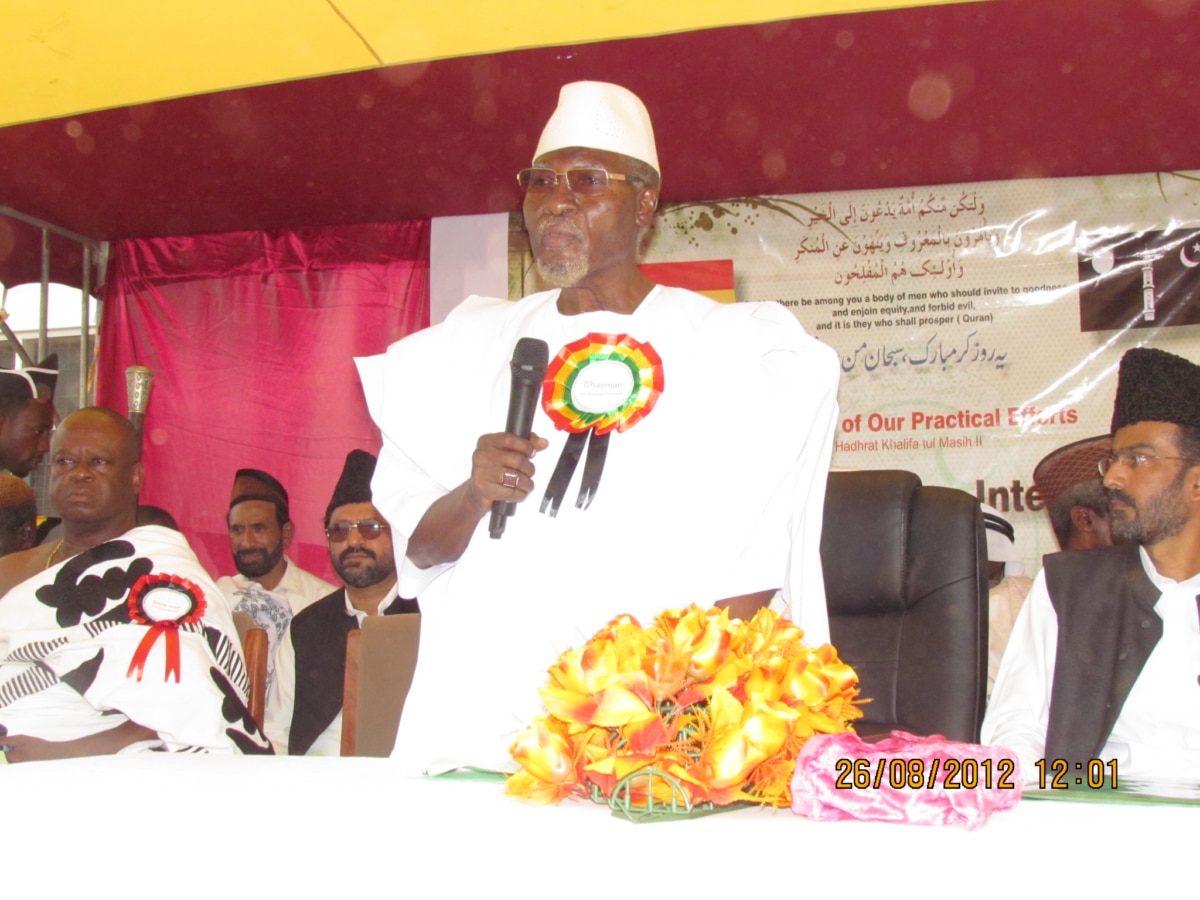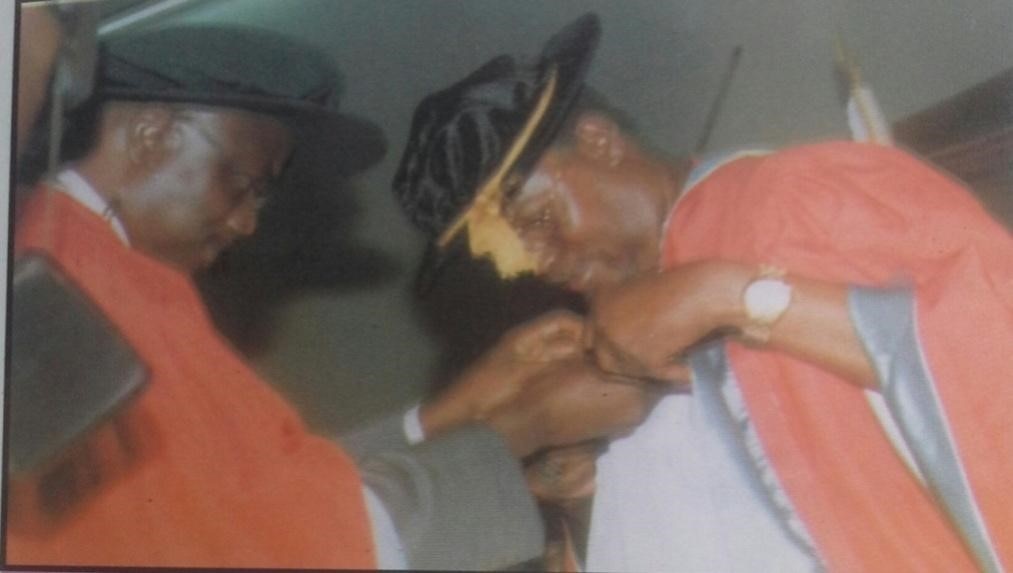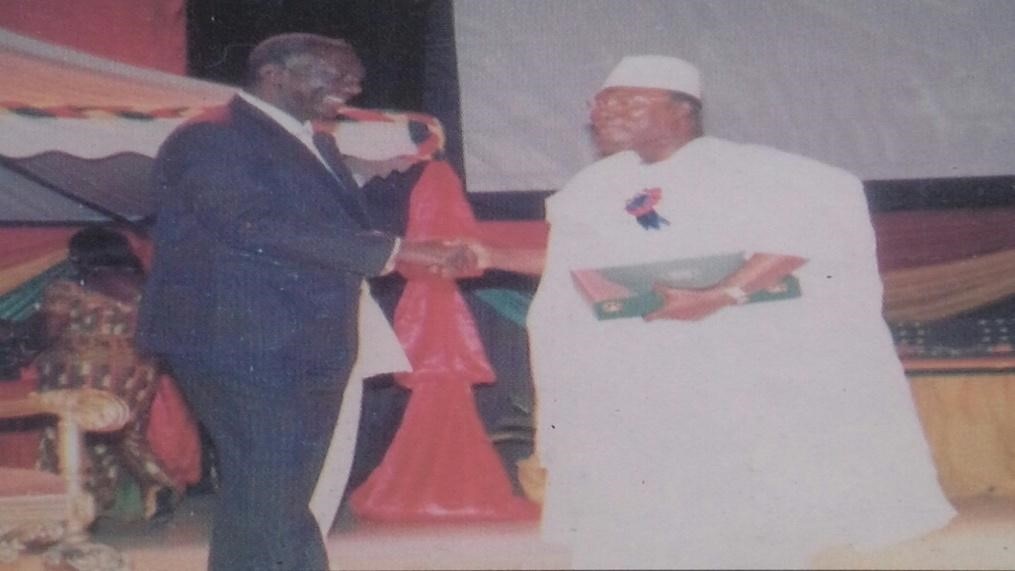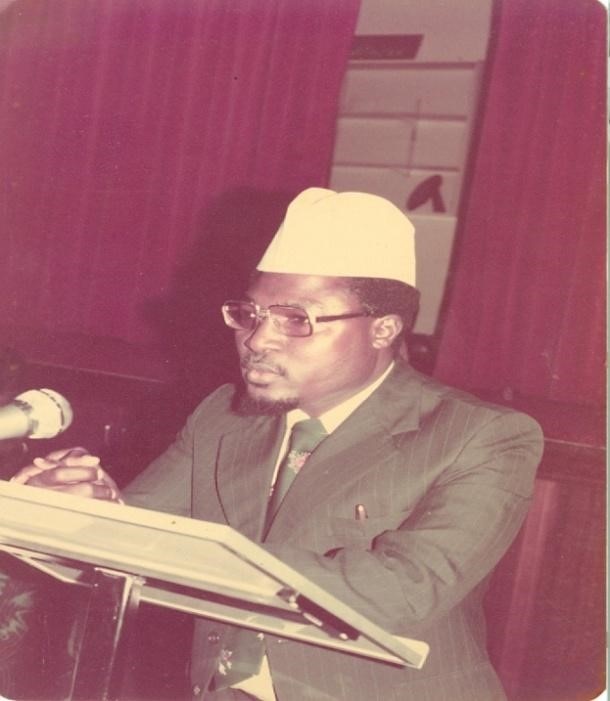Ali Fatty, Student Jamia Ahmadiyya International Ghana

As Ahmadi Muslims, we are privileged to have individuals such as teachers and mentors who embody the very essence of loyalty, humility, and obedience to Khilafat-e-Ahmadiyya. One such exemplary figure was the highly esteemed, devoted, and humble missionary, Maulana Dr Abdul Wahab Bin Adam Sahib from Ghana, West Africa.
In his tribute Friday Sermon for the late Maulana Dr Abdul Wahab Bin Adam Sahib on 27 June 2014, Hazrat Mirza Masroor Ahmad, Khalifatul Masih Vaa highly commended him, stating that he would discuss the life of a devoted servant who had entirely dedicated himself to Khilafat-e-Ahmadiyya. He referred to Abdul Wahab Bin Adam Sahib, who had journeyed from his African homeland to Markaz, driven by a strong commitment to be a helper of the institution of Khilafat. (Friday Sermon, 27 June 2014)
Prior to his passing, Dr Abdul Wahab Bin Adam Sahib served as the Amir and Missionary-in-Charge of the Ahmadiyya Muslim Mission in Ghana, roles he fulfilled with great dedication over many years.
Beginning his service within the Ahmadiyya Muslim Community as a missionary, his unwavering dedication, exceptional leadership qualities, and significant contributions to the establishment and progress of the Ahmadiyya Muslim Mission in Ghana and several other African nations distinguished him as a prominent figure widely respected by all.
The current Amir and Missionary in Charge of Ghana, Maulana Noor Muhammed Bin Salih, reflected on his character, noting,
“Maulana Wahab Sahib was a true missionary for all intents and purposes. Not only as a missionary but also as a statesman, he [greatly influenced] the people of Ghana.
“He was very much dedicated to his course. It was not surprising therefore that to most people of the country, Ahmadiyyat was synonymous with Wahab Sahib and vice versa.” (Life History and Character of Amir [Abdul] Wahab Bin Adam by Maulvi Donkour Abu Basheer, p. 82)
Moreover, his significant involvement in numerous successful developmental projects in collaboration with the government earned him recognition as a distinguished statesman in Ghana. Abdul Wahab Bin Adam Sahib’s name became well-known across the nation.
Hazrat Khalifatul Masih Vaa, in his sermon, lauded Abdul Wahab Bin Adam Sahib’s contributions to the growth of Ahmadiyyat in Ghana, highlighting the establishment of over four hundred schools and seven large hospitals, along with two homoeopathy clinics under his leadership. He also noted Abdul Wahab Sahib’s initiative to install large billboards featuring the Promised Messiah’saa photograph on major highways in Ghana, proclaiming the arrival of the awaited Messiah. (Friday Sermon, 27 June 2014)
Family Background
Maulvi Abdul Wahab Bin Adam Sahib was born on 8 December 1938 to Ahmadi Muslim parents in the village of Adansi Brofoyedru, near Fomena, in the Ashanti region of Ghana. The introduction of Ahmadiyyat to his family came through his father, Sulayman Sahib, and his mother, Aisha Akua Woro.
It was the fervent wish of Wahab Sahib’s father for him to pursue a service as a missionary, a dream that was first left unfulfilled due to his untimely demise when Wahab Sahib was still very young. However, in honour of his father’s wish, his mother, Aisha Akua Woro, ensured his religious education by sending him to Rabwah with Missionary Basharat Rasheed Sahib, who was returning to Pakistan.
Reflecting on his educational journey before leaving Ghana for higher theological studies, Wahab Bin Adam Sahib attended the Methodist Primary School in Adansi Brofoyedru from 1942 to 1948. He then continued his education at United Senior School from 1948 to 1950, before completing his senior secondary education at T. I. Ahmadiyya Secondary School, now known as T. I. Ahmadiyya Senior High School Kumasi (AMASS PHOBIA). (Life history and character of Amir Wahab Bin Adam, p. 25)
A prophecy of the Promised Messiahas
The Promised Messiahas received the following revelation from Allah the Almighty:
“People who We shall direct by revelation from heaven will help you’ (Tadhkirah [English], 2009, p.850) and in 1907, God revealed to the Promised Messiahas that “[…] They will be coming to you by every distant track.” (Tadhkirah [English], 2009, p. 975)
This profound revelation received by the Promised Messiahas, promising divine support and the arrival of followers from distant lands, resonates with the journeys of many devoted individuals, including Wahab Sahib. This prophecy, highlighting the global embrace and divine backing of Ahmadiyyat, was exemplified by numerous believers who, driven by faith, traversed great distances to serve the mission, thereby affirming the truthfulness of the Promised Messiahas as a prophet of God. Hazrat Amirul Momineen, Khalifatul Masih Vaa, in his Friday sermon of 27 June 2014, reflected on the manifestation of this revelation through the lives of such dedicated individuals and said:
“[…] This revelation has been fulfilled with great glory during the lifetime of the Promised Messiah[as] as well as with reference to Khilafat established after him and through him. Not only are these people inclined to the Community, but they also dedicate their lives to the cause of the mission with great zeal and sincerity and thus become excellent helpers of the Promised Messiah[as] and are also helpers of his Khulafa”. (Friday Sermon, 27 June 2014)
Huzoor added, “Such people are pious-natured and God’s grace is on them and it makes them shine brilliantly like a star. One Such sincere and devoted individual was respected Abdul Wahab Bin Adam Sahib” (Ibid.)
Life at Jamia Ahmadiyya Rabwah, Pakistan
During his time at Jamia Ahmadiyya in Rabwah, Pakistan, Dr Abdul Wahab Bin Adam Sahib, alongside numerous peers from Africa, arrived in a nascent Rabwah, a settlement established post the 1947 partition, designated as the new global headquarters for the Ahmadiyya Muslim Community. This initial phase saw Rabwah as a stark, barren landscape, grappling with frequent dust storms, and devoid of any greenery.
This period marked a significant transition, particularly for those from Africa, unaccustomed to Rabwah’s culinary, and climatic conditions, notably its harsh winters and distinct environment. Despite these challenges, Dr Wahab Bin Adam Sahib and his fellow students remained undeterred in their mission to assimilate the teachings of the Promised Messiahas in their original Urdu, with the aim of disseminating these teachings back in Africa, thereby adhering to the Islamic directive that “It is not possible for the believers to go forth all together. Why, then, does not a party from every section of them go forth that they may become well-versed in religion, and that they may warn their people when they return to them, so that they may guard against evil?” (Surah at-Taubah, Ch.10: V.122)
Hazrat Khalifatul Masih Vaa recounted the conditions they faced upon their arrival in Rabwah, highlighting the absence of basic amenities like electricity and the need to source drinking water from afar. The living quarters, with roofs made from unbaked bricks, were prone to leaks during rains, causing their belongings to occasionally float in the accumulating water.
Among the memorable experiences of Maulana Wahab Sahib was his interaction with esteemed Companions of the Promised Messiahas. A particularly significant event was his visit to Maulana Ghulam Rasool Rajeki Sahibra, seeking blessings for his forthcoming examinations, a task made daunting by the language barrier. Maulana Rajeki Sahibra prayed for them, confidently saying that both he and his colleague would excel in their exams and pass with flying colours. He shared a vision he had while praying for them, where he saw the Promised Messiahas placing his hands on the heads of the two students. Remarkably, Wahab Sahib emerged as the top student in his class. (Friday Sermon, 27 June 2014)
Love and obedience to the institution of Khilafat
Maulana Dr Abdul Wahab Bin Adam Sahib exemplified profound devotion and unwavering loyalty to the institution of Khilafat, embodying the highest standards of obedience and reverence for the Khalifa of the time. His life was a testament to his belief in the central role of Khilafat-e-Ahmadiyya as the cornerstone of his spiritual and worldly achievements. (Ibid.)
His exceptional adherence and love for the Khilafat and its incumbent Khalifa were encapsulated by Hazrat Khalifatul Masih Vaa, who noted, “He was attuned to every nuance of the Khalifa’s guidance, embracing each directive with full faith. His concern extended beyond mere compliance with instructions; he was earnest in his desire to fulfil the Khalifa’s every wish.” (Ibid.)
This profound allegiance was further demonstrated in his final days when, despite medical advice to seek hospitalisation, he insisted on obtaining Huzoor’saa permission first, showcasing his deep-seated commitment to Khilafat until his last moments.
In a conversation with Dr Hassan Sahib, Maulana Wahab Bin Adam Sahib’s son, insights into his father’s remarkable resilience and patience were shared. Dr Hassan highlighted his father’s ability to place the Jamaat’s welfare above personal trials, illustrated poignantly on the day he learned of his son-in-law’s tragic passing in the USA. Despite the heartbreaking news, Maulana Wahab Bin Adam Sahib fulfilled his commitment to preside over an annual award ceremony at Jamiatul Mubashireen Ghana, maintaining composure throughout the event. Only after its conclusion did he share the sombre news, exemplifying his extraordinary fortitude and dedication to his duties.
Recipient of the blessings of Khilafat
Maulana Dr Abdul Wahab Bin Adam Sahib was distinguished by the unique honour and privilege of receiving numerous blessings from the Khulafa of the Ahmadiyya Muslim Jamaat, marking several firsts in his illustrious career. He was the pioneering African Central Missionary from Ghana, the inaugural Amir and Missionary-in-Charge of the nation, and the first African Ahmadi to be appointed as Amir Muqami. (Ibid.)
In his role as Amir Muqami, he was tasked with leading the community in the five daily prayers and the Jumuah prayer in Huzoor’srh absence. His profound humility and respect were evident when he hesitated to lead prayers in the presence of the Jamaat’s esteemed scholars and the venerable Companions of the Promised Messiahas. This humility led him to request Maulana Abul Ata Sahib, who was honoured by the second Khalifa with the title of Khalid-e-Ahmadiyyat for his significant services, to lead the prayers.
However, despite the revered Maulana Abdul Ata Sahib’s high status, he still submitted to Maulana Dr Abdul Wahab Bin Adam Sahib that he could not lead the prayers in his presence except if he commanded him to do so. (Life History and Character of Amir [Abdul] Wahab Bin Adam by Maulvi Donkour Abu Basheer, p. 50-51)
Maulana Dr Abdul Wahab Bin Adam Sahib’s service extended beyond Africa; he was the first African Central missionary to serve in Europe and represented the Jamaat in various countries, including Canada, Germany, Benin, Mali, Ivory Coast, Nigeria, Burkina Faso, Liberia, Sierra Leone, and Jamaica. (Friday Sermon, 27 June 2014)
In recognition of his exemplary dedication and service, the annual PAAMA meeting following the Jalsa Salana UK in 2014 saw the introduction of the “Abdul Wahab Adam Award” by Hazrat Amirul Momineenaa, celebrating the commitment and sacrifices of Ahmadi missionaries in Africa. Further honouring his legacy, the MTA International studio in Ghana was inaugurated in 2021 by Hazrat Khalifatul Masihaa and named the “Wahab Adam Studio”.
Some accolades
Beyond his spiritual achievements within the Ahmadiyya Muslim Community, Maulana Abdul Wahab Bin Adam Sahib was the recipient of numerous prestigious accolades in recognition of his relentless pursuit of peace and development in Ghana and beyond. His efforts in initiating various projects earned him widespread acclaim in both the religious and secular spheres.
Among his notable recognitions were an honorary doctorate from the University of Cape Coast, Ghana, and the Distinguished Leadership Award from the International Lincoln Centre, Louisiana State University, USA. His contributions to interfaith harmony and national cohesion were further acknowledged through his memberships in the National Peace Council (NPC) and the Ghana Conference of Religions for Peace (GCRP). Additionally, as one of the founding members of the Ghana National Hilal Committee, he played a pivotal role in advocating for the official recognition of Muslim holidays in Ghana.
Maulana Dr Abdul Wahab Bin Adam Sahib’s stature as a respected statesman in Ghana was unparalleled. He was frequently called upon by national leaders to mediate political disputes and spearhead reconciliation efforts, underscoring his influential role in fostering national unity.
In tribute to his distinguished life and service, Maulana Dr Abdul Wahab Bin Adam Sahib was accorded a ceremonial state burial at the courtyard of the state house. This solemn occasion was attended by a host of dignitaries, including high-ranking government officials, opposition leaders, and international figures, as well as the vice president of Ghana, highlighting the profound respect and honour he commanded across the nation.
In a heartfelt final tribute, Hazrat Khalifatul Masih Vaa led the funeral prayer in absentia for Maulana Dr Abdul Wahab Bin Adam Sahib and dedicated a moving eulogy to him in his Friday sermon. May Allah elevate Maulana Sahib’s ranks in paradise and shower His infinite mercy upon him. Amin.




